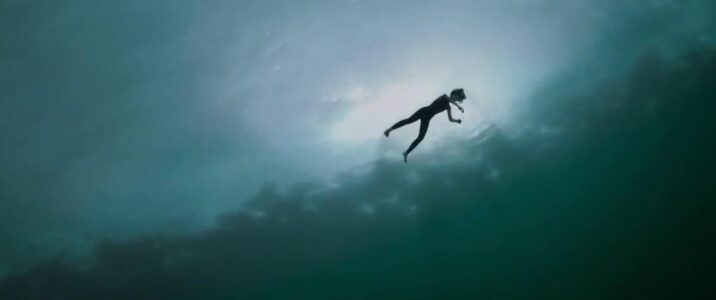Looking at the films highlighted on the fourth day of the London Film Festival, you’d be hard-pressed to find a clear connection between all three. Though two of them share similar subject matter, their formal and narrative qualities provide such marked contrasts that they have just as much in common with, say, a love story about a mermaid than they do with each other. But this trio of films gradually branched out in scope, from an intimate chamber drama to a rambunctious ensemble piece. From the individual to the communal, an absence which drives an inarticulable yearning provides the emotional spine of today’s remarkable, emotionally earnest lineup.
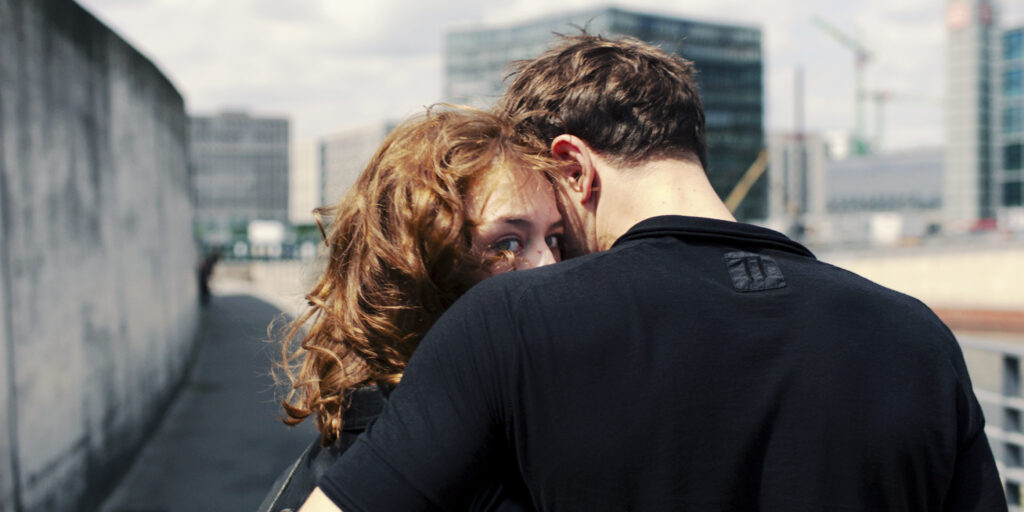
A degree of wounded vulnerability has defined the oeuvre of Christian Petzold. Over the last three decades, Petzold has slowly risen in the ranks of the great modern German filmmakers with a consistent interest in melding the mythic with the historical. While his latest film, Undine [4/5] continues that tradition, it marks the first time the director of Yella and Barbara has treaded into the realm of fairy tales. Yet the wounded heart at the center of Undine is consonant with his preceding masterworks.
The fulcrum around which the film revolves is Paula Beer in the title role. She is a historian working for the Senate Department of Urban Development and Housing in Berlin. We open in media res as she is being dumped by her boyfriend Johannes (Jacob Matschenz) at a café next to her workplace where she gives guided tours of model replicas of the city. He tries letting her down easily, but she tells him that if he leaves he must die. She says it less like a threat and more like a statement of fact. Leave he does, but she (and we) forget about him when a chance encounter with an member of the tour, an industrial diver named Christoph (Franz Rogowski), kindles new romance in Undine’s life.
Anyone with a passing knowledge of mythology will recall the Ondine is a water creature who gains both a soul and mortality upon marrying a human. Petzold doesn’t chart a strict correlation between his fable and Paracelsus’ definition, but rather skews closer to a more corporeal reconfiguration of these tropes. After a dive in a river seemingly causes Undine to almost drown, Christoph administers CPR, softly singing Stayin’ Alive to maintain the tempo of chest compressions. Undine makes it clear she doesn’t require CPR, but asks Christoph to continue causing her heart to beat. That she becomes enamored with the Bee Gees single solidifies a link between the physical and sentimental sensations that resemble something one might call love.
Indeed, the film’s romanticism is sustained by the palpable chemistry between its two leads. When Undine visits Christoph, he runs alongside her train as it enters and departs the station, Rogowski’s face beaming with boyish enthusiasm. But Beer has the most difficult task at fitting within Petzold’s singular fusion of the grounded and the fantastic. Her extensive knowledge of Berlin’s history lends Undine a wizened quality Beer projects with a knowing, often fierce flash of her green eyes. Her seemingly guileless nature is challenged by a chance encounter with Johannes whilst walking arm in arm with Christoph. She looks back to the man who broke her heart, an act rife with Orphic connotations which sets into motion a series of tragic, melodramatic events.
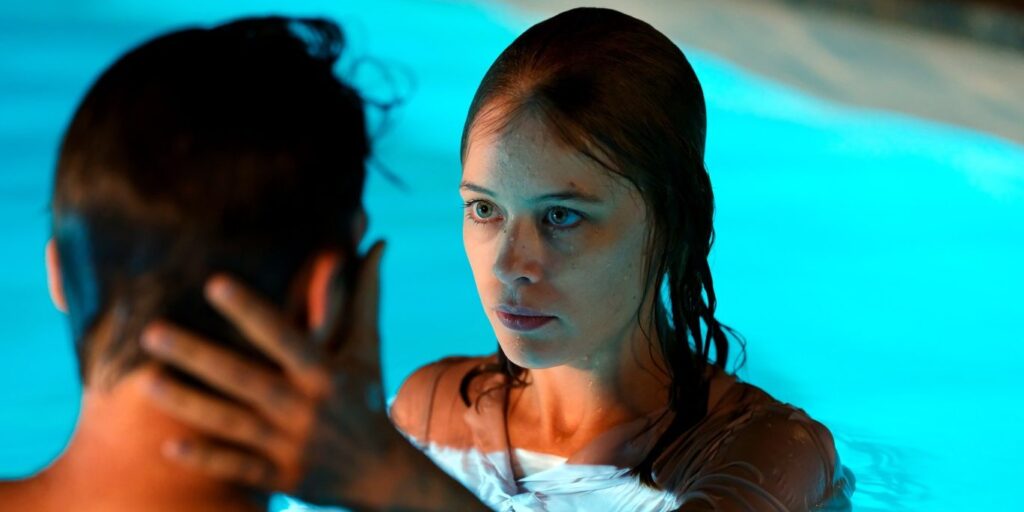
Petzold’s application of melodrama to historicity produces ambivalent visions of human behavior. The ephemeral tide of time, visually rhymed by trains and rivers, prompts Petzold’s characters to compartmentalize aspects of a changing world for the sake of stability. Small buildings in the Berlin model are color-coordinated, indicating which have existed before and after reunification between east and west. This attempt at gauging transformation eases, in Undine’s words, “the pain of a psychic amputation.” Petzold’s strongest work, like Phoenix and Transit, branch out from the intimacy of this psychological violence toward the broader impact of history, often questioning its formation by hegemonic, predominantly male figures. Undine‘s paucity of political interrogation steers the film toward the tone of a bittersweet reverie, heightened by the tremulous piano in Bach’s Adagio or roving camerawork that drifts away from faded names carved in stone underwater.
This slightness makes the final twenty minutes feel extraneous, a touching if unnecessary coda to a story which has already reached its proper conclusion. But if Undine is a minor work, it’s flashes of brilliance still show its director’s consummate skill in visually pairing his characters with a physical and historical geography in constant flux. At its best, Undine is a spellbinding, achingly tender entry in a career dedicated toward exploring the national character of Germany through the stories which endure.
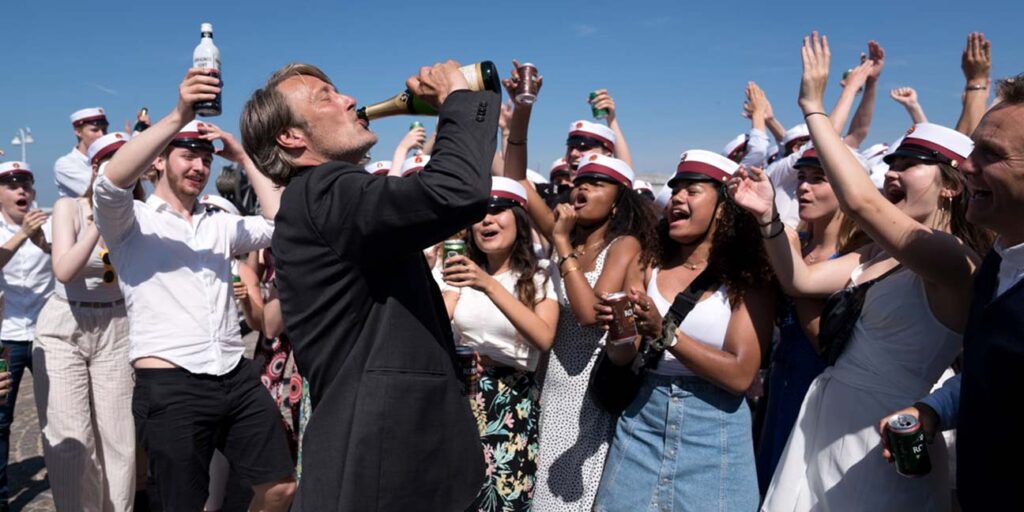
Just to the north of Germany, national narratives and cultural norms in Denmark provide as much of a thematic heft for Druk [3.5/5], the latest film from Dogme 95 co-founder Thomas Vinterberg. Titled Another Round in English (as opposed to the direct translation of “binge-drinking”), this tragicomic romp treads familiar ground with its story of four middle-aged men undergoing a crisis of masculinity. Yet the film weaves an intriguing thread between their nascent forays into alcoholic misadventure and a broader propagation of virility borne from perpetual inebriation in a country that has the highest alcohol intake on average of any Nordic nation.
The four men in question all work as teachers at the same school. Martin (Mads Mikkelsen) has settled into a stasis both professionally and at home with his wife Anika (Maria Bonnevie) and their two adolescent sons. He attends a dinner with Peter (Lars Ranthe) and Tommy (Thomas Bo Larsen) celebrating the fortieth birthday of Nikolaj (Magnus Millang) where the conversation leads to a discussion over Norwegian philosopher Finn Skåderud’s hypothesis that human experience can be enhanced with a consistent BAC level hovering above 0.05%. On a lark, the men decide to put this theory to the test, and you can imagine how well it goes.
Except, initially at least, the men find themselves surprised at their greater sense of confidence and relaxation within their teaching environments. Martin’s staid and esoteric lectures give way to more engaging lessons where he quizzes the class on 20th Century political leaders in relation to their alcohol intake. That the class initially believes Hitler would make a more “electable” leader than Churchill or Franklin Roosevelt based on his sobriety prompts Martin to tell his class, “The world is never as you a suspect”, with just a hint of pride at his own cleverness.

Vinterberg punctures Martin’s argument not just by having the plot devolve into the inevitable beats of degradation and humiliation. A paratextual montage of pictures and footage with contemporary political figures like Boris Johnson and Boris Yeltsin either holding beers or flagrantly drunk provides an implicit rebuke of the privilege Churchill’s mythic image projects. Indeed, the fetishization of purported male geniuses like Ernest Hemingway doesn’t offer inspiration so much as a way to avoid the dull malaise these men experience with their families, or in Peter’s case a camper with only an old dog for company.
Druk does strive for honesty in its portrayal of the euphoric high inebriation provides its primary quartet. A round of highballs sends the men dancing through Nikolaj’s living room, the camera moving in tandem with their swaying to the seductive groove of Cissy Strut by The Meters. Though no sooner do we settle into the rhythm of the editing than Vinterberg smash cuts to static wide shots of the men stumbling through a supermarket, their BAC levels well above 1% while they search for fresh cod. These men end up being neither heroic nor repugnant, and Vinterberg’s transition from the darkly comic to its grim aftermath thankfully avoids tonal whiplash.
If there is a twinge of disappointment to Druk, it’s that the film’s dual stabs at social commentary and character study fail to coalesce into little more than a predictable climax. The ambiguity of the final shot doesn’t betray anything that came before it, yet it doesn’t enhance these preceding passages either. Ultimately, Druk settles for being an entertaining, witty parable elevated by a faultless cast, led by a typically superb Mikkelsen. His fearless exposure of masculine anxiety, devoid of self-consciousness in even his most acrobatic moments, once again remind us why he’s one of the finest Danish actors of his generation.
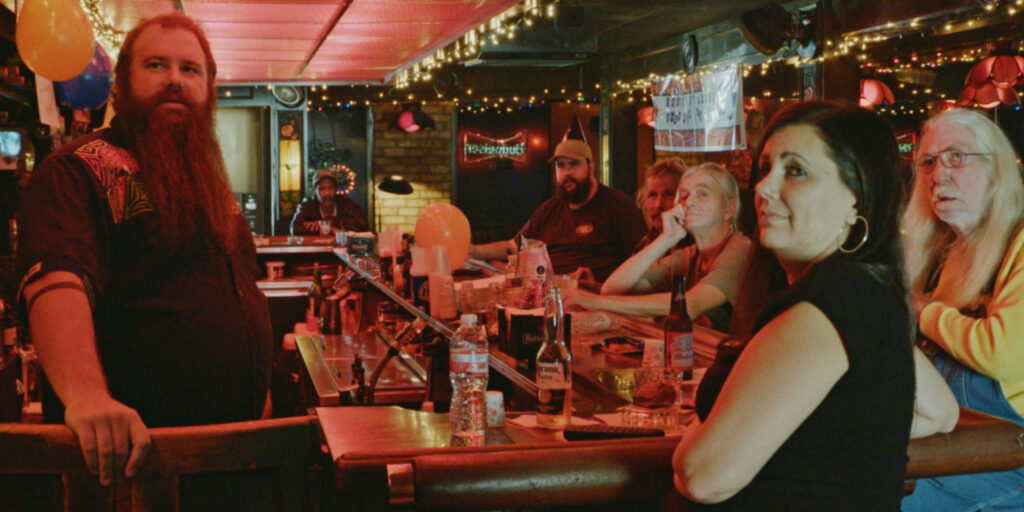
There is as much ambition in the similarly boozy Bloody Nose, Empty Pockets [4/5], the new documentary project from the Turner and Bill Ross IV. But calling it a “documentary” in the strict sense of the word wouldn’t be entirely accurate. By planting a group of strangers in a Las Vegas bar not set anywhere near Vegas, the film unfolds as a fascinating, revealing, and deeply troubling experiment in sociological observation.
The concept is a snapshot in the final day of the Roaring 20s, a beloved Vegas bar whose interiors were, in fact, shot in New Orleans. The figures who frequent the bar, both patrons and employees alike, are all non-actors. Well, save for one; Michael Martin “plays” an actor also named Michael, the most faithful customer of the bar. He is in nearly every scene of the film, often ruminating over his own failed career, slinging streams of caustic quips one after another (“I pride myself on not becoming an alcoholic until after I was a failure,” is a particular highlight). As he becomes progressively drunker, the ability to tell how much he is “performing”, either for his co-stars or for us, becomes disturbingly unclear.
Indeed, the alcohol served in the film is real, as are several tabs of acid introduced later in the night. We see several patrons get, for lack of a better phrase, utterly shit-faced as the camera settles beside them, as if seated in an empty stool. One man, Ira, is told he has to go to work after his employers call, to which he can only repeatedly ask where he needs to go to work. A woman, Pam, flashes everyone in sight, purportedly reveling in her own self-admitted immaturity. Watching some of these scenes of unsimulated intoxication can instantly veer from transgressive to uncomfortable, and it’s the film’s adamant refusal to place an audience on a pedestal above its subjects which prevents these scenes from being outright exploitation.
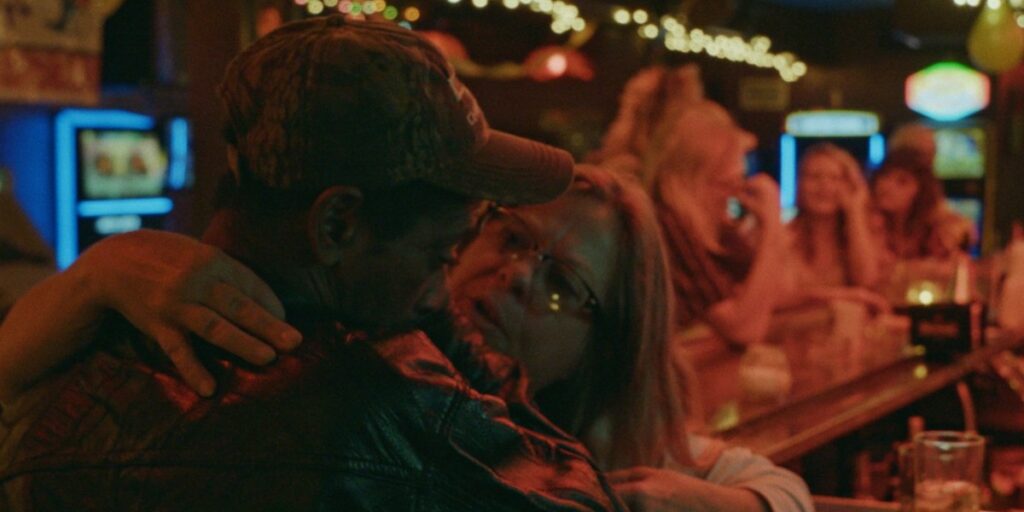
The question of how exploitative the Ross Brothers are themselves in capturing footage of unvarnished pain in an artificial setting remains a potent point of debate. Yet by devaluing the realism of its location, the film draws our attention to how a communal space of any kind can provide an outlet for airing grievances, a luxury so many of the subjects in this film have been stripped of by a pandemic that’s already profited American oligarchs. Several conversations, including one Pam has with another regular about their shared familial losses, captures a sense of camaraderie which can only stem from a place where people can go to confide in each other. The pain extends to other patrons like Bruce, a black veteran whose rage at the country he feels abandoned speaks all-too-clearly to the pervasive feeling of disposability visited upon those exploited for political gain.
But Bloody Nose, Empty Pockets is neither mere political tract or sentimental slop. Several customers liken their fellow patrons to family, a comparison Michael sneers at with derision. “I am somebody you hang out with at the bar,” he says while clutching a drink in his slim hands. Eugene O’Neill’s Long Day’s Journey Into Night is explicitly referenced by Michael, yet the film he stars in is far more reminiscent of The Iceman Cometh. That epic play’s nihilism is echoed by a belligerent young man named David, who is constantly picking fights with older patrons. “You don’t represent evil,” he tells Michael. “You represent nothing.”
That disillusionment is what makes the elements of artifice in Bloody Nose, Empty Pockets so curiously moving as well as disturbing. It’s digressive, direct-cinema aesthetic captures gestures as minute as a young man flirtatiously holding a blushing woman’s hand to pinpoint the meaning formed from pipe dreams O’Neill’s Hickey in Iceman fervently disavowed. If the second sentence of the Declaration of Independence, cited in the film’s opening hand-written scrawl, is anything to heed, then the truths of these people are self-evident. Because without them, what else have they got?
Tomrrow:
Bohdan Sláma’s Shadow Country, a slice of body horror from Brandon Cronenberg, and the winner of this year’s Golden Lion at Venice.
